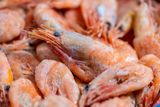A recent shipment of frozen shrimp imported from Indonesia has been recalled due to elevated levels of cesium-137 (Cs-137), a radioactive isotope. The U.S. Food and Drug Administration (FDA) intervened after the shrimp was detained at customs, raising concerns about potential health risks associated with radiation exposure.
Cs-137 is a byproduct of nuclear fission and does not occur naturally. Its presence in food is linked to historical nuclear testing and accidents, which have spread trace amounts globally. The FDA reported that the shrimp contained approximately 68 becquerels per kilogram (Bq/kg) of Cs-137, well below the FDA’s safety cutoff of 1200 Bq/kg. Nonetheless, this level was unusual enough to prompt the recall.
Understanding Radiation in Food
Inside the body, Cs-137 mimics potassium and can distribute into soft tissues, emitting gamma and beta radiation. While the detected levels in the shrimp do not pose an immediate health threat, prolonged exposure, even to low levels of manmade isotopes, can increase cancer risk. The Agency for Toxic Substances and Disease Registry notes that Cs-137 has a half-life of about 30 years, explaining why it remains detectable decades after its initial release.
To provide context, the radiation level found in the shrimp is comparable to the natural radioactivity of a banana, which contains potassium-40. One would need to consume around 100 bananas to equal the daily background radiation exposure typical in the United States. However, the key distinction lies in the source: Cs-137 is entirely manmade, while potassium-40 is a naturally occurring isotope.
What Consumers Should Know
The FDA has confirmed that the contaminated shrimp did not reach U.S. grocery stores, as the batch was flagged by Customs and Border Protection before distribution. Ongoing monitoring of imported seafood will help ensure that such incidents do not affect consumers.
If you have purchased imported shrimp recently, the FDA advises checking the lot numbers. Products from the recalled batch should be disposed of and not consumed. Those who may have eaten shrimp from the affected lot and are concerned about exposure are encouraged to consult their healthcare provider.
Fortunately, the situation has been managed effectively, with low radiation levels detected and preventive measures in place. Consumers can feel reassured knowing that regulatory bodies are actively monitoring food safety to protect public health.
This article serves for informational purposes and does not constitute medical advice. For more details on food safety, visit the FDA website or consult health professionals.
The information presented here is based on credible sources, including the U.S. Food and Drug Administration, the Agency for Toxic Substances and Disease Registry, and the United States Environmental Protection Agency.
